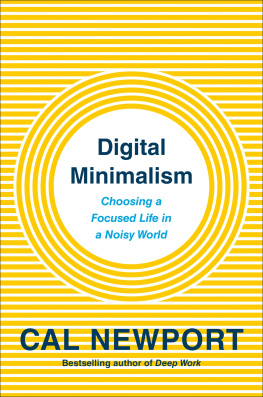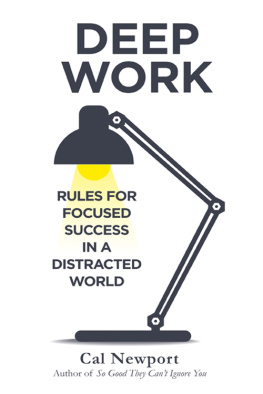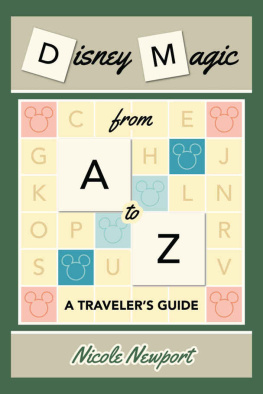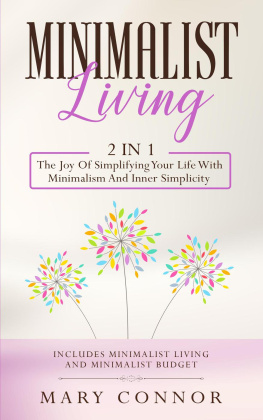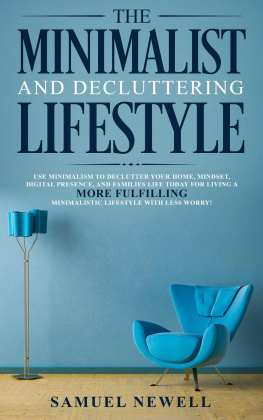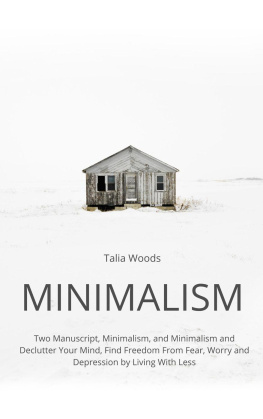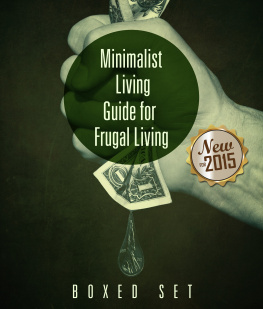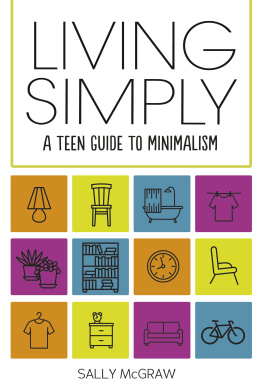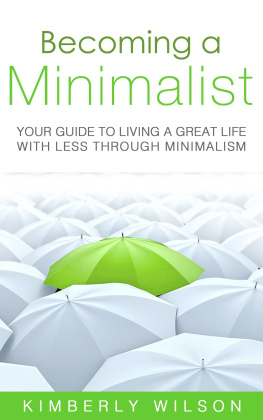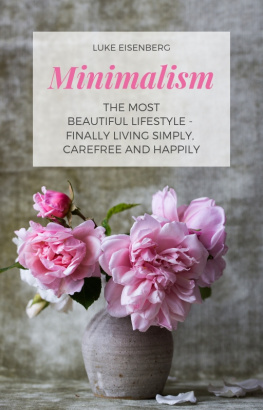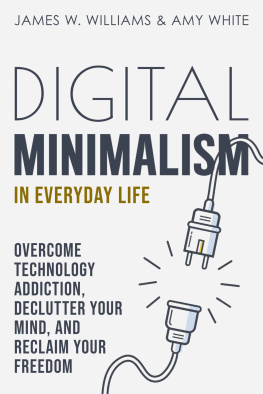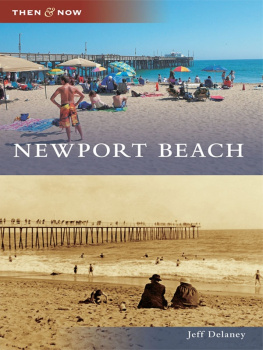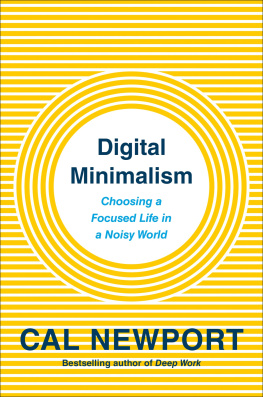Newport - Digital minimalism: on living better with less technology
Here you can read online Newport - Digital minimalism: on living better with less technology full text of the book (entire story) in english for free. Download pdf and epub, get meaning, cover and reviews about this ebook. City: New York, year: 2019, publisher: Penguin Publishing Group;Portfolio;Penguin, genre: Romance novel. Description of the work, (preface) as well as reviews are available. Best literature library LitArk.com created for fans of good reading and offers a wide selection of genres:
Romance novel
Science fiction
Adventure
Detective
Science
History
Home and family
Prose
Art
Politics
Computer
Non-fiction
Religion
Business
Children
Humor
Choose a favorite category and find really read worthwhile books. Enjoy immersion in the world of imagination, feel the emotions of the characters or learn something new for yourself, make an fascinating discovery.
- Book:Digital minimalism: on living better with less technology
- Author:
- Publisher:Penguin Publishing Group;Portfolio;Penguin
- Genre:
- Year:2019
- City:New York
- Rating:4 / 5
- Favourites:Add to favourites
- Your mark:
- 80
- 1
- 2
- 3
- 4
- 5
Digital minimalism: on living better with less technology: summary, description and annotation
We offer to read an annotation, description, summary or preface (depends on what the author of the book "Digital minimalism: on living better with less technology" wrote himself). If you haven't found the necessary information about the book — write in the comments, we will try to find it.
Digital minimalism: on living better with less technology — read online for free the complete book (whole text) full work
Below is the text of the book, divided by pages. System saving the place of the last page read, allows you to conveniently read the book "Digital minimalism: on living better with less technology" online for free, without having to search again every time where you left off. Put a bookmark, and you can go to the page where you finished reading at any time.
Font size:
Interval:
Bookmark:
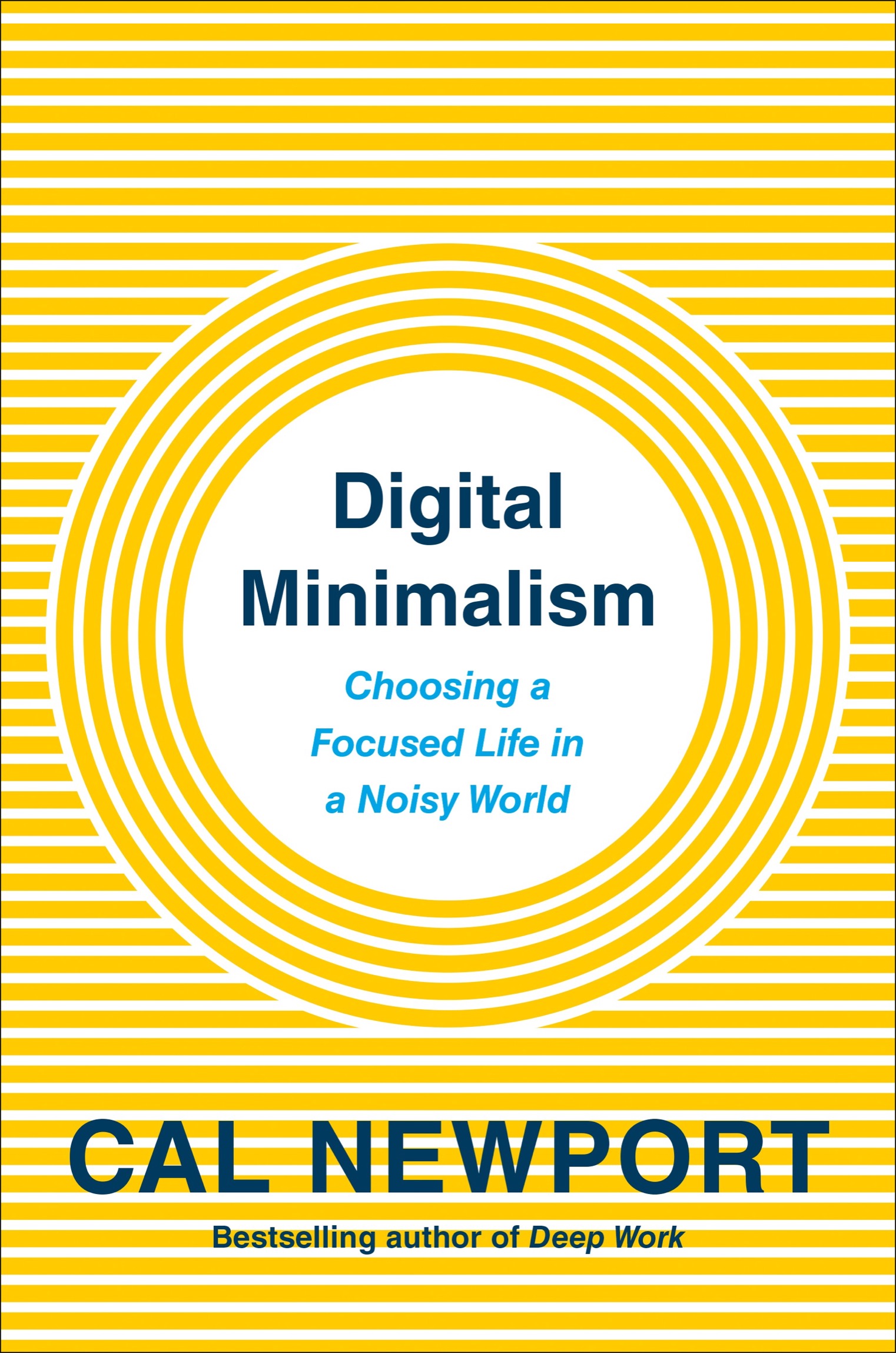
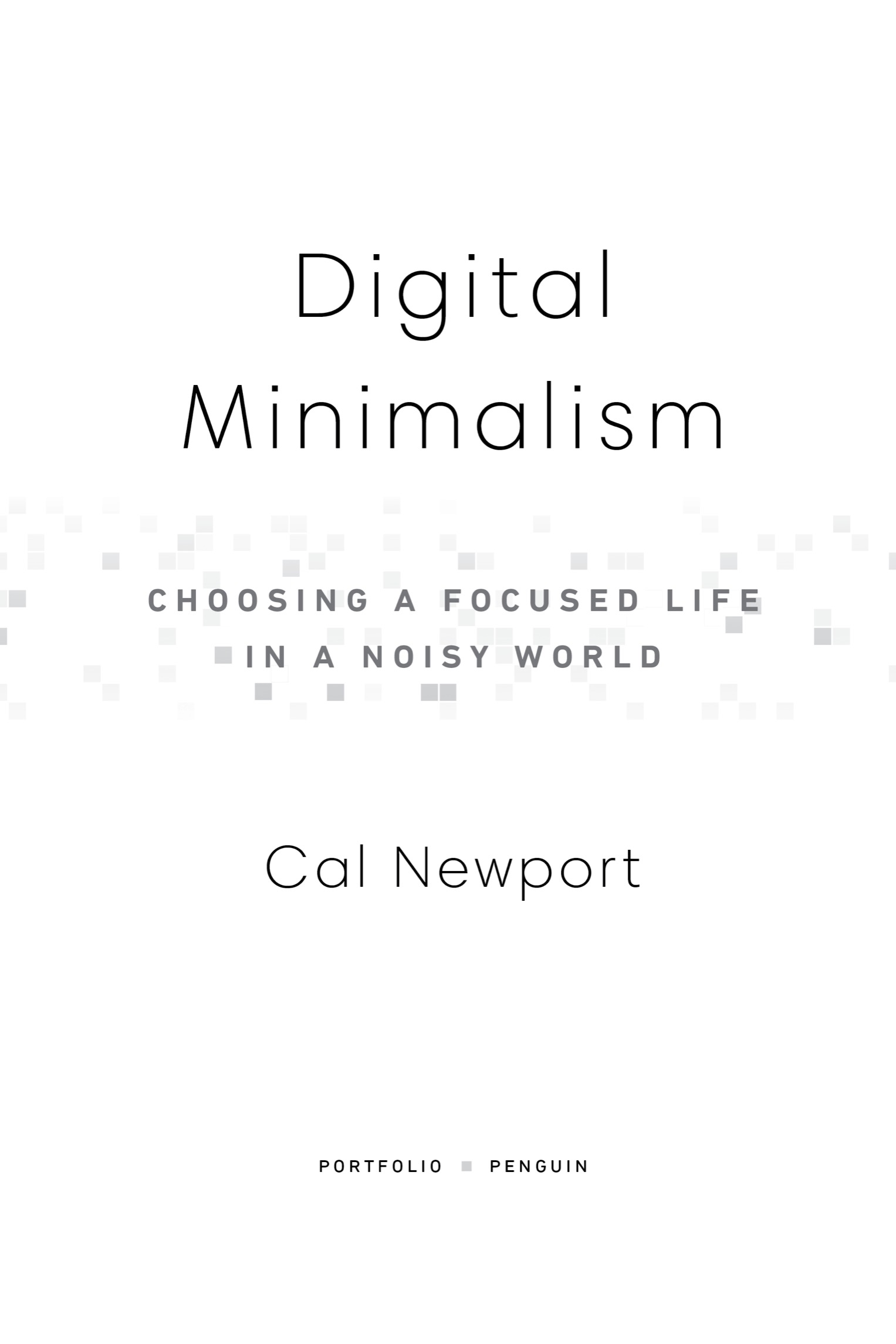
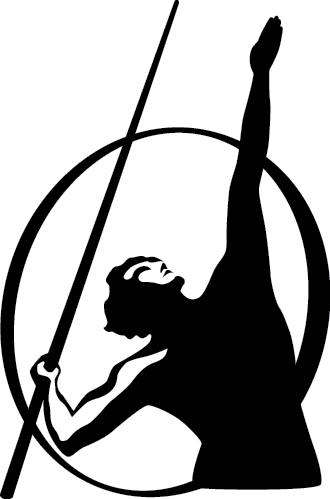
Portfolio/Penguin
An imprint of Penguin Random House LLC
penguinrandomhouse.com
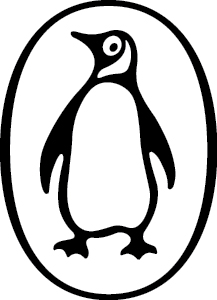
Copyright 2019 by Calvin C. Newport
Penguin supports copyright. Copyright fuels creativity, encourages diverse voices, promotes free speech, and creates a vibrant culture. Thank you for buying an authorized edition of this book and for complying with copyright laws by not reproducing, scanning, or distributing any part of it in any form without permission. You are supporting writers and allowing Penguin to continue to publish books for every reader.
Library of Congress Cataloging-in-Publication Data
Names: Newport, Cal, author.
Title: Digital minimalism : on living better with less technology / Cal Newport.
Description: New York : Portfolio/Penguin, 2019. | Includes bibliographical references and index.
Identifiers: LCCN 2018041568 (print) | LCCN 2018043187 (ebook) | ISBN 9780525536543 (Ebook) | ISBN 9780525536512 (hardcover) | ISBN 9780525542872 (international edition)
Subjects: LCSH: Information technologySocial aspects. | Internet addictionSocial aspects. | Technological innovationsSocial aspects.
Classification: LCC HM851 (ebook) | LCC HM851 .N49256 2019 (print) | DDC 303.48/33dc23
LC record available at https://lccn.loc.gov/2018041568
While the author has made every effort to provide accurate telephone numbers, Internet addresses, and other contact information at the time of publication, neither the publisher nor the author assumes any responsibility for errors, or for changes that occur after publication. Further, the publisher does not have any control over and does not assume any responsibility for author or third-party websites or their content.
Penguin is committed to publishing works of quality and integrity. In that spirit, we are proud to offer this book to our readers; however, the story, the experiences, and the words are the authors alone.
Version_2
my partner, my muse, my voice of reason
In September 2016, the influential blogger and commentator Andrew Sullivan wrote a 7,000-word essay for New York magazine titled I Used to Be a Human Being. Its subtitle was alarming: An endless bombardment of news and gossip and images has rendered us manic information addicts. It broke me. It might break you, too.
The article was widely shared. Ill admit, however, that when I first read it, I didnt fully comprehend Sullivans warning. Im one of the few members of my generation to never have a social media account, and tend not to spend much time web surfing. As a result, my phone plays a relatively minor role in my lifea fact that places me outside the mainstream experience this article addressed. In other words, I knew that the innovations of the internet age were playing an increasingly intrusive role in many peoples lives, but I didnt have a visceral understanding of what this meant. That is, until everything changed.
Earlier in 2016, I published a book titled Deep Work. It was about the underappreciated value of intense focus and how the professional worlds emphasis on distracting communication tools was holding people back from producing their best work. As my book found an audience, I began to hear from more and more of my readers. Some sent me messages, while others cornered me after public appearancesbut many of them asked the same question: What about their personal lives? They agreed with my arguments about office distractions, but as they then explained, they were arguably even more distressed by the way new technologies seemed to be draining meaning and satisfaction from their time spent outside of work. This caught my attention and tumbled me unexpectedly into a crash course on the promises and perils of modern digital life.
Almost everyone I spoke to believed in the power of the internet, and recognized that it can and should be a force that improves their lives. They didnt necessarily want to give up Google Maps, or abandon Instagram, but they also felt as though their current relationship with technology was unsustainableto the point that if something didnt change soon, theyd break, too.
A common term I heard in these conversations about modern digital life was exhaustion. Its not that any one app or website was particularly bad when considered in isolation. As many people clarified, the issue was the overall impact of having so many different shiny baubles pulling so insistently at their attention and manipulating their mood. Their problem with this frenzied activity is less about its details than the fact that its increasingly beyond their control. Few want to spend so much time online, but these tools have a way of cultivating behavioral addictions. The urge to check Twitter or refresh Reddit becomes a nervous twitch that shatters uninterrupted time into shards too small to support the presence necessary for an intentional life.
As I discovered in my subsequent research, and will argue in the next chapter, some of these addictive properties are accidental (few predicted the extent to which text messaging could command your attention), while many are quite purposeful (compulsive use is the foundation for many social media business plans). But whatever its source, this irresistible attraction to screens is leading people to feel as though theyre ceding more and more of their autonomy when it comes to deciding how they direct their attention. No one, of course, signed up for this loss of control. They downloaded the apps and set up accounts for good reasons, only to discover, with grim irony, that these services were beginning to undermine the very values that made them appealing in the first place: they joined Facebook to stay in touch with friends across the country, and then ended up unable to maintain an uninterrupted conversation with the friend sitting across the table.
I also learned about the negative impact of unrestricted online activity on psychological well-being. Many people I spoke to underscored social medias ability to manipulate their mood. The constant exposure to their friends carefully curated portrayals of their lives generates feelings of inadequacyespecially during periods when theyre already feeling lowand for teenagers, it provides a cruelly effective way to be publicly excluded.
In addition, as demonstrated during the 2016 presidential election and its aftermath, online discussion seems to accelerate peoples shift toward emotionally charged and draining extremes. The techno-philosopher Jaron Lanier convincingly argues that the primacy of anger and outrage online is, in some sense, an unavoidable feature of the medium: In an open marketplace for attention, darker emotions attract more eyeballs than positive and constructive thoughts. For heavy internet users, repeated interaction with this darkness can become a source of draining negativitya steep price that many dont even realize theyre paying to support their compulsive connectivity.
Encountering this distressing collection of concernsfrom the exhausting and addictive overuse of these tools, to their ability to reduce autonomy, decrease happiness, stoke darker instincts, and distract from more valuable activitiesopened my eyes to the fraught relationship so many now maintain with the technologies that dominate our culture. It provided me, in other words, a much better understanding of what Andrew Sullivan meant when he lamented: I used to be a human being.
Font size:
Interval:
Bookmark:
Similar books «Digital minimalism: on living better with less technology»
Look at similar books to Digital minimalism: on living better with less technology. We have selected literature similar in name and meaning in the hope of providing readers with more options to find new, interesting, not yet read works.
Discussion, reviews of the book Digital minimalism: on living better with less technology and just readers' own opinions. Leave your comments, write what you think about the work, its meaning or the main characters. Specify what exactly you liked and what you didn't like, and why you think so.

